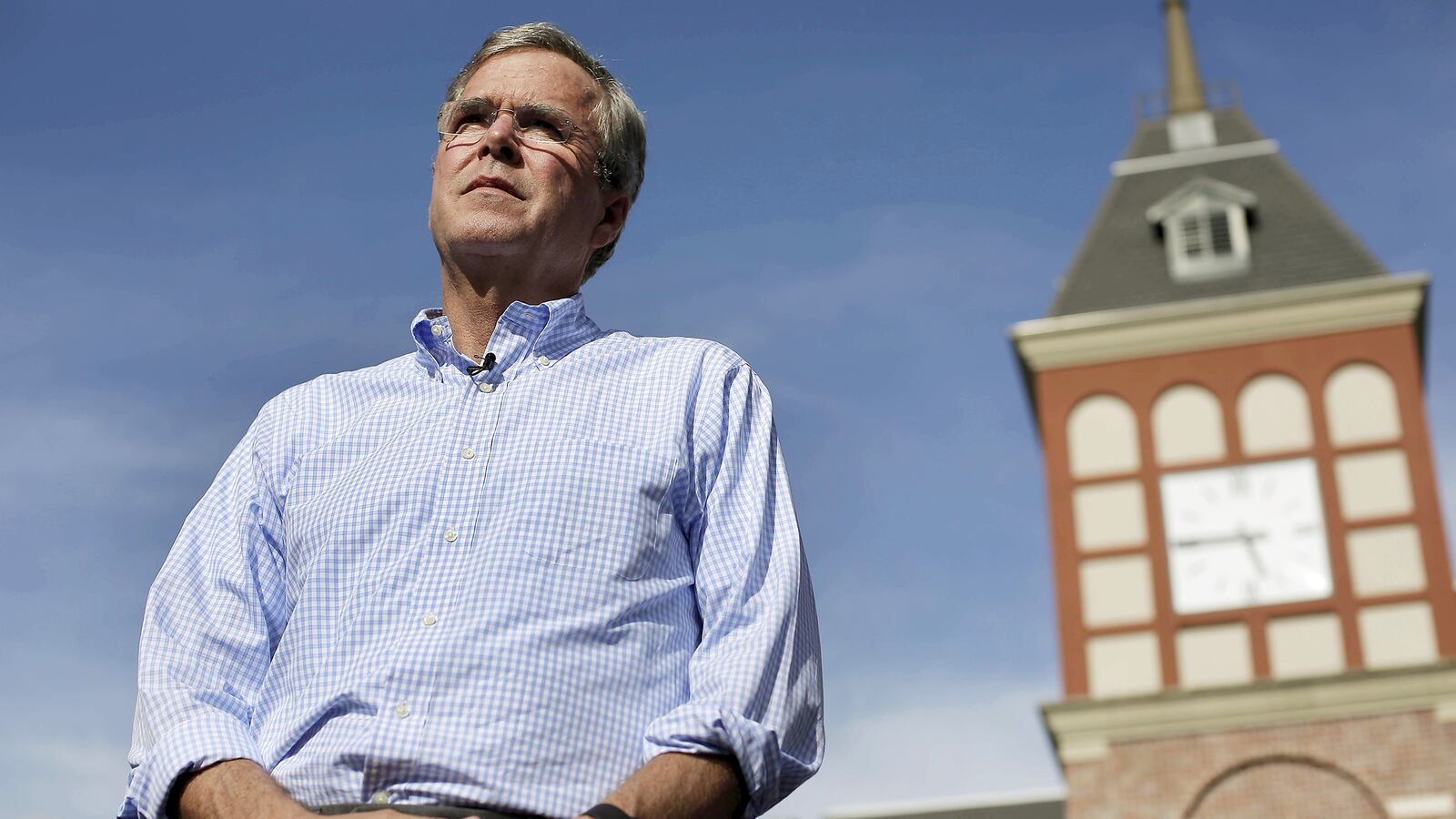Evangelicals aren’t typically the target audience for Roman Catholic theology talk. Low-church Protestants from the Bible Belt have historically been hostile to Catholicism, even sometimes fearing that Catholics’ devotion to the pope will lead to one-world government, and that their political clout in the United States presages the end times.
So it was perhaps a little surprising when Jeb Bush, who converted to his wife’s Catholicism, launched into an emotional testimony before a predominantly evangelical audience on Friday about the joy he felt when he left Protestantism.
Catholics and Evangelicals haven’t always played well together. In 2008, Rev. John Hagee—a Texas pastor and one of the country’s most powerful evangelical leaders—apologized to Bill Donohue of the Catholic League for intimating that the Catholic church was the “great whore” of Revelation, and for telegraphing the kind of anti-Catholic rhetoric typically associated with 19th-century nativists. (Among Southern Baptists, in particular, there’s long been a flamboyantly anti-Catholic strain of thought and rhetoric.) And while conservative Catholics and evangelical Protestants are simpatico when it comes to certain public policy goals, they usually avoid public discussions about areas of theological disagreement.
But here in a ballroom in a hotel in D.C.’s Woodley Park neighborhood, Bush decided that courting the country’s leading social conservative activists could entail discussing one of the elements of Catholic theology that’s least amenable to evangelicals—namely the blessed sacraments, which include confession and communion.
“I converted to the Catholic Church—Christ came into my life a little earlier, but I converted to being Catholic in honor of my wife and because I believe in the blessed sacraments and they give me great comfort,” he said at the beginning of his speech before the Faith and Freedom Coalition. “On Easter Sabbath of 1995, I had lost an election in 1994 and found a total serenity and solace in the RCIA class, and converted to being a Catholic and it’s been an organizing part of my architecture, if you will, as a person and certainly as an elected official.”
RCIA stands for Rite of Christian Initiation of Adults, and refers to the catechesis process that would-be Catholic converts go through before entering the Church.
Evangelicals, needless to say, do not see the act of leaving Protestantism as something that should necessarily be a source of “total serenity and solace.” And sometimes, as in Hagee’s case, their leaders show outright hostility to those who jump ship. So Bush’s willingness to talk explicitly about his decision to leave behind the Protestantism that galvanizes so many members of the Faith and Freedom Coalition audience reflects an important shift in the way social conservatives talk to each other.
Yes, the two groups have long been political allies—the evangelical George W. Bush handily won Catholics in 2004, and the stalwart Catholic Rick Santorum was kept afloat in the 2012 GOP primary by Southern evangelicals. But increasingly, evangelical Christians and conservative Roman Catholics are finding common ground not just in their shared political concerns but also in a shared language about personal devotion to faith.
And that shared devotion played heavily in Bush’s speech, as he reiterated his support for the Little Sisters of the Poor, a group of Catholic nuns embroiled in a fight with the federal government over contraceptive coverage, and his repulsion with Hillary Clinton’s comment that “religious beliefs…have to be changed.” Clinton’s camp hasn’t clarified which specific religious beliefs she thinks must change, but conservatives like Bush have taken the comment as a direct attack on their pro-life convictions. Bush’s criticism of Clinton’s comment drew warm applause from the crowd.
Penny Nance, an evangelical Christian who heads the conservative Concerned Women for America, said those comments reflect growing unity and cooperation between conservative Catholics and evangelicals.
“We are more united than we have been in my lifetime, certainly,” she said. “Catholics and evangelicals have certainly linked arms and will continue to link arms over the issue of life and marriage.”
“Jeb embracing his Catholicism is not a problem for evangelicals,” she added.
Nance would know—she wrote a Fox News op-ed in February of 2012 titled “We are all Catholics now”. And Patricia Miller of Salon argued in March of this year that white Catholics’ increasing affinity for the GOP could become a problem for the Democratic party.
“[F]or the first time, white Catholics are more Republican than the voting group usually considered the ultimate Republicans: white Protestants,” she wrote.
It’s just one more indicator that despite a fraught history, Protestant Evangelicals and conservative Catholics have become a cohesive political unit. As the two groups become more and more closely allied on public policy issues, and as they both increasingly adopt a defensive posture in the culture wars, conservative Catholic candidates like Bush will feel more comfortable talking about their faith in more explicit ways before Evangelical audiences.






